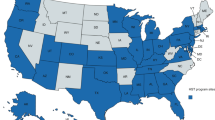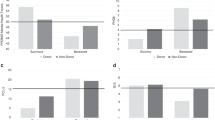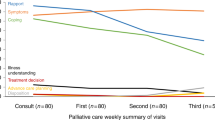Abstract
BMT professionals were compared regarding their willingness to proceed with allogeneic BMT given select psychosocial issues. A questionnaire was sent to 660 physician members of ASBMT, 92 social work members of BMT Special Interest Group, Association of Oncology Social Work, and 626 nurse members of BMT Special Interest Group, Oncology Nursing Society; 597 responded with a response rate of 43.5%. Items included background information, followed by 17 case vignettes; each represented a different psychosocial issue to which respondents indicated whether or not they would recommend proceeding with allogeneic BMT. In every vignette, at least 10% of respondents indicated they would not proceed. In six vignettes, at least 64% indicated do not proceed: suicidal ideation (86.8%), uses addictive illicit drugs (81.7%), history of noncompliance (80.5%), no lay caregiver (69.3%), alcoholic (64.8%), and mild dementia/Alzheimer's (64.4%). In 10 vignettes, at least 73% indicated proceed. On four vignettes, professional subgroups differed in their recommendation on whether or not to proceed with allogeneic BMT. Qualitative data suggest that this decision is contingent on the perceived acuity, severity, and currency of the psychosocial issue, patient ability to comply with treatment given the issue, and its manageability as a risk factor for treatment related vulnerability and outcomes.
This is a preview of subscription content, access via your institution
Access options
Subscribe to this journal
Receive 12 print issues and online access
$259.00 per year
only $21.58 per issue
Buy this article
- Purchase on Springer Link
- Instant access to full article PDF
Prices may be subject to local taxes which are calculated during checkout
Similar content being viewed by others
References
Bolwell BJ . Are predictive factors clinically useful in bone marrow transplantation? Bone Marrow Transplant 2003; 32: 853–861.
Schulz-Kindermann F, Hennings U, Ramm G, Zander AR, Hasenbring M . The role of biomedical and psychosocial factors for the prediction of pain and distress in patients undergoing therapy and BMT/PBSCT. Bone Marrow Transplant 2002; 29: 341–351.
Syrjala KL, Chapko MK, Vitaliano PP, Cummings C, Sullivan KM . Recovery after allogeneic marrow transplantation: prospective study of predictors of long-term physical and psychosocial functioning. Bone Marrow Transplant 1993; 11: 319–327.
Sullivan AK, Szkrumelak N, Hoffman LH . Psychological risk factors and early complications after bone marrow transplantation in adults. Bone Marrow Transplant 1999; 24: 1109–1120.
Gregurek R, Labar B, Mrsic M, Batinic D, Ladika I, Bogdanic V et al. Anxiety as a possible predictor of acute GVHD. Bone Marrow Transplant 1996; 18: 585–589.
Colon EA, Callies AL, Popkin MK, McGlave PB . Depressed mood and other variable related to bone marrow transplantation survival in acute leukemia. Psychosomatics 1991; 32: 420–425.
Loberiza FR, Rizzo JD, Bredeson CN, Antin JH, Horowitz MM, Weeks JC et al. Association of depressive syndrome and early deaths among patients after stem-cell transplantation for malignant diseases. J Clin Oncol 2002; 20: 2118–2126.
Foster LW, McLellan LJ, Rybicki LA, Sassano DA, Hsu A, Bolwell BJ . Survival of allogeneic bone marrow transplant patients: the relative importance of in-hospital lay care-partner support. J Psychosocial Oncol 2004; 22: 1–20.
Andrykowski MA, Brady MJ, Henslee-Downey PJ . Psychosocial factors predictive of survival after allogeneic bone marrow transplantation for leukemia. Psychosomatic Med 1994; 56: 432–439.
McConville BJ, Steichen-Asch P, Harris R, Neudorf S, Sambrano J, Lampkin B et al. Pediatric bone marrow transplants: psychological aspects. Can J Psychiatry 1990; 35: 769–775.
Molassiotis A, van den Akker OBA, Milligan DW, Goldman JM . Symptom distress, coping style and biological variables as predictors of survival after bone marrow transplantation. J Psychosomatic Res 1997; 42: 275–285.
Neuser J . Personality and survival time after bone marrow transplantation. J Psychosomatic Res 1988; 32: 451–455.
Tschuschke V, Hertenstein B, Arnold R, Bunjes D, Denzinger R, Kaechele H . Associations between coping and survival time of adult leukemia patients receiving allogeneic bone marrow transplantation: results of a prospective study. J Psychosomatic Res 2001; 50: 277–285.
Chang G, Antin H, Orav EJ, Randall U, McGarigle C, Behr HM . Substance abuse and bone marrow transplant. Am J Drug Alcohol Abuse 1997; 23: 301–308.
Hoodin F, Kalbfleisch KR, Thrornton J, Ratanatharathorn V . Psychosocial influences on 305 adults' survival after bone marrow transplantation; depression, smoking, and behavioral self-regulation. J Psychosomatic Res 2004; 57: 145–154.
Broers S, Hengeveld MW, Kaptein AA, Le Cessie S, van de Loo F, de Vries T . Are transplant psychosocial variables related to survival after bone marrow transplantation? A prospective study of 123 consecutive patients. J Psychosomatic Res 1998; 45: 341–351.
Jenkins PL, Lester H, Alexander J, Whittaker J . A prospective study of psychosocial morbidity in adult bone marrow transplant recipients. Psychosomatics 1994; 35: 361–367.
Murphy KC, Jenkins PL, Whittaker JA . Psychosocial morbidity and survival in adult bone marrow transplant recipients − a follow-up study. Bone Marrow Transplant 1996; 18: 199–201.
Clarke B, Engler H . Patients with morbid obesity don't get life-saving transplants. Obesity Surg 1999; 9: 77–79.
Weitzner MA, Lehninger F, Sullivan D, Fields KK . Borderline personality disorder and bone marrow transplantation: Ethical considerations and review. Psycho-Oncology 1999; 8: 46–54.
Bishop MM, Rodrigue JR, Wingard JR . Mismanaging the gift of life: non compliance in the context of adult stem cell transplantation. Bone Marrow Transplant 2002; 29: 875–880.
Cohen RL, Paul J . A prisoner in need of a bone marrow transplant. Hastings Center Report 1987; 17: 26–27.
Downs S . Ethical issues in bone marrow transplant. Semin Oncol Nurs 1994; 10: 58–63.
Levenson JL, Olbrisch ME . Psychosocial evaluation of organ transplant candidates. A comparative survey of process, criteria, and outcomes in heart, liver, and kidney transplantation. Psychosomatics 1993; 34: 314–323.
Corley MC, Westerberg N, Elswick RK, Connell D, Neil J, Sneed G et al. Rationing organs using psychosocial and lifestyle criteria. Res Nurs Health 1998; 21: 327–337.
Dew MA, Switzer GE, DiMartini AF, Matukaitis J, Fitzgerald MG, Kormos RL et al. Psychosocial assessments and outcomes in organ transplantation. Prog Transplant 2000; 10: 239–261.
Dobbels F, De Geest S, Cleemput I, Fischler B, Kesteloot K, Vanhaecke J et al. Psychosocial and behavioral selection criteria for solid organ transplantation. Prog Transplant 2001; 11: 121–132.
Olbrisch ME, Levenson JL . Psychosocial Evaluation of heart transplant candidates: an international survey of process, criteria, and outcomes. J Heart Lung Transplant 1991; 10: 948–955.
Olbrisch ME, Levenson JL . Psychosocial assessment of organ transplant candidates. Current status of methodological and philosophical issues. Psychosomatics 1995; 36: 236–243.
Foster LW, McLellan LJ . Moral judgments in rationing of health care resources: a comparative study of clinical health professionals. Social Work Health Care 1997; 25: 13–36.
Parkes CM . Psycho-social transitions: a field for study. Soc Sci Med 1971; 5: 101–115.
Andrykowski MA, Brady MJ, Hunt JW . Positive psychosocial adjustment in potential bone marrow transplant recipients: Cancer as a psychosocial transition. Psycho-Oncology 1993; 2: 261–276.
Acknowledgements
We wish to thank Julie Curtis, RN, Administrator, BMT Program, Cleveland Clinic Foundation, for assistance obtaining the Oncology Nursing Society mailing list and for administrative support of this research project. We also wish to thank Candice Vidovic, graduate assistant, School of Social Work, Cleveland State University, for assistance in reviewing and summarizing qualitative data.
Author information
Authors and Affiliations
Corresponding author
Rights and permissions
About this article
Cite this article
Foster, L., McLellan, L., Rybicki, L. et al. Allogeneic BMT and patient eligibility based on psychosocial criteria: a survey of BMT professionals. Bone Marrow Transplant 37, 223–228 (2006). https://doi.org/10.1038/sj.bmt.1705219
Received:
Revised:
Accepted:
Published:
Issue Date:
DOI: https://doi.org/10.1038/sj.bmt.1705219
Keywords
This article is cited by
-
Patient eligibility for hematopoietic stem cell transplantation: a review of patient-associated variables
Bone Marrow Transplantation (2019)
-
Psychosocial Assessment of Candidates for Transplant (PACT) as a tool for psychological and social evaluation of allogeneic hematopoietic cell transplantation recipients
Bone Marrow Transplantation (2019)
-
Caregiver availability and patient access to hematopoietic cell transplantation: social worker perspectives inform practice
Supportive Care in Cancer (2019)
-
Psychosocial risk predicts high readmission rates for hematopoietic cell transplant recipients
Bone Marrow Transplantation (2018)
-
Another reason to encourage psychosocial risk assessment in hematopoietic cell transplantation
Bone Marrow Transplantation (2018)



